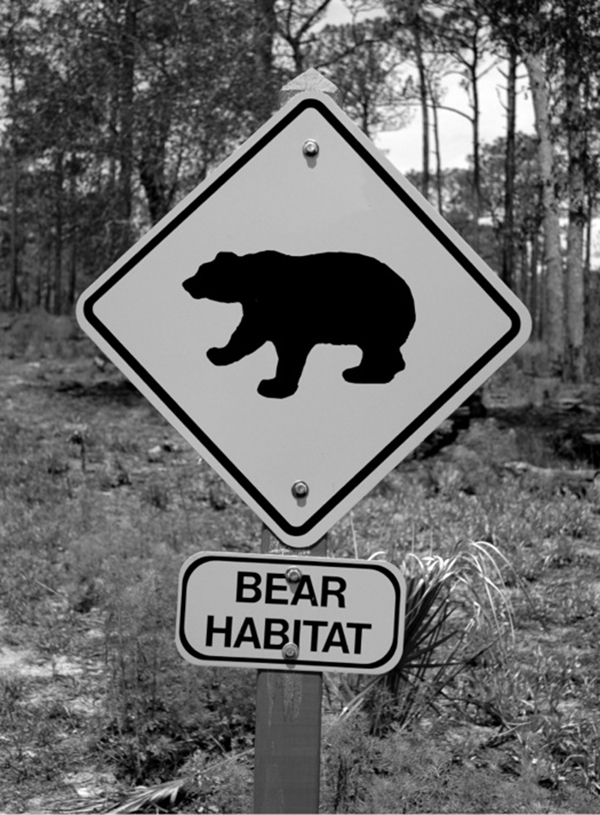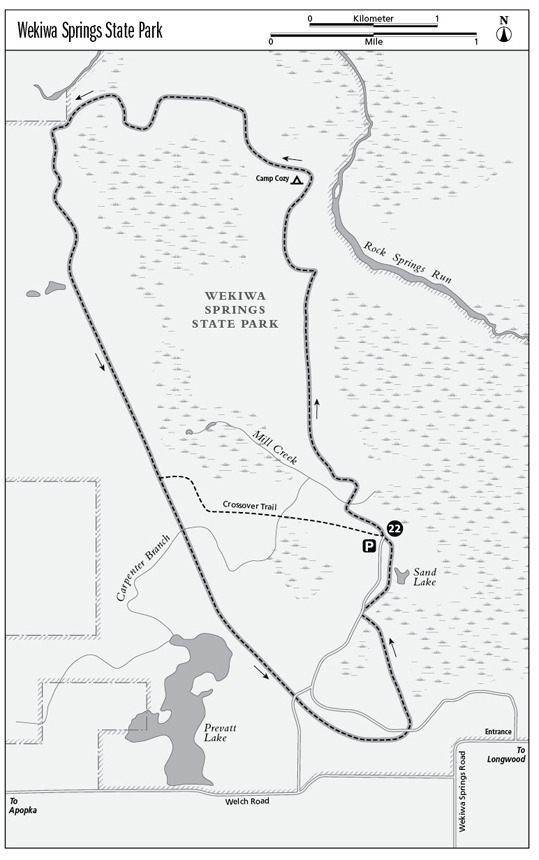
Black bears are common in Central Florida, particularly at Wekiwa Springs State Park. Overnight campers must take special precautions to bear-proof their supplies.
22 Wekiwa Springs State Park: Wekiwa Springs Loop Trail
Wekiwa Springs State Park is a 7,800-acre scenic wonder little changed from the days when the Timucuan Indians speared fish in the spring-fed creeks and stalked deer in the uplands. As the metropolitan Orlando area grows ever denser, Wekiwa Springs is turning into a priceless urban preserve of nature. It features extensive hiking with primitive wilderness camping in an otherwise heavily developed part of central Florida. The nearest town is Apopka, an Indian word apparently meaning “Big Potato.”
Nearest town: Apopka
Start: Sand Lake parking lot
Distance: 10.2-mile loop
Approximate hiking time: 5 to 6 hours
Trail surface: Mostly dirt path
Seasons: Fall through spring
Other trail users: Nature watchers
Canine compatibility: Leashed dogs permitted
Land status: State park
Fees and permits: Entrance fee under $5
Schedule: Open 8:00 a.m. to sunset daily
Maps: Available at the ranger station
Trail contact: Wekiwa Springs State Park, 1800 Wekiwa Circle, Apopka, FL 32712; (407) 884-2008; www.floridastateparks.org/wekiwasprings. Note: Streets are known both as Wekiwa (name of the state park) and Wekiva (name of the river running through the park). If that seems confusing to you, residents don’t know what to make of it either.
Finding the trailhead: The park is located about 20 minutes from Orlando. Turn off Interstate 4 at exit 94 and turn left to go under the State Road 436 overpass. Follow the signs on State Road 434 west to Wekiwa Springs Road. Turn right onto Wekiwa Springs Road and travel approximately 4 miles to the park entrance on the right. Turn left when the entrance road Ts after the ranger station. Follow the road until it ends at the Sand Lake parking lot. GPS: N28 43.423' W081 28.398'
The Hike
Traffic passing the entrance is so thick it almost demands a stoplight in order to drive out. Yet inside Wekiwa, it’s back to the Florida of wading birds, otters, raccoons, alligators, and even black bears.
On weekends Sand Lake tends to attract a boisterous crowd, but a few hundred yards into the woods, the blaring boom box music will be filtered out. This loop trail soon moves among towering pines, thick palmettos, and a dense ground covering of ferns. If it weren’t for the palmettos, it would be easy to mistake this for the pinewoods of a more northern state.
Wildlife here is abundant, so don’t be surprised to hear bushes moving or dead palm fronds snapping. White-tailed deer and black bear are common in the region, but the racket is probably nothing more than an armadillo.
The trail itself can be muddy after heavy rains. At the Sand Lake trailhead, go north, which will take you to some of most interesting parts of the walk and also offer you the opportunity to cut the hike short after 6.7 miles via a cross trail. You’re not likely to bail out unless the weather has turned sour or the humidity is overwhelming. The scenery is just too pretty.

Black bears are common in Central Florida, particularly at Wekiwa Springs State Park. Overnight campers must take special precautions to bear-proof their supplies.
Moving forward, you’ll quickly come to a primitive campsite at a spot called Camp Cozy. It is, too, with a chance to take fresh water from the crystal clear Rock Springs Run, perhaps even take a dip in it. Enjoy this closeness to the fast stream since the hike will shortly move well away from it.
After passing the bailout cross trail at 6.7 miles, you’ll encounter a large dry sinkhole to the east (left) of the trail. It’s large enough to be a small and deep (for Florida) pond, but the water table is too low for the depression to fill. That doesn’t mean conditions will change, since Florida’s terrain is constantly changing due to the appearance of new sinkholes and the steady erosion of the limestone rock under most of the state. These Florida “earthquakes” usually occur on a small, individualized basis, sometimes swallowing up houses or taking big bites out of roadways.
Florida’s largest sinkhole occurred here in 1981 when in one day the earth suddenly opened up in the town of Winter Park. Within 24 hours the sinkhole swallowed a house, public pool, and almost an entire city block, including some expensive sports cars from a helpless dealership. The shore of the sinkhole was stabilized and landscaped so the sinkhole now appears like a small lake. Yet the ground could open up again sometime to increase the lake’s diameter.
Near the end of the hike you’ll encounter a short 0.9-mile side trail on the right leading to Wekiva Springs itself, a wonderful place to take a dip if it’s been a hot day. The spring basin is shallow, varying from 1 to 4 feet with a sandy bottom. If you brought a picnic lunch, a lawn chair, or a blanket for simply relaxing in the sun, the hillside overlooking the spring basin is where you want to head afterwards. Or, if you’re still full of energy, rent a canoe to paddle the Wekiva River.
From this side trail to Wekiwa Springs, it’s only another 1.2 miles to the parking lot at Sand Lake, the trail’s end.
 Why do the spring and river have different but such similar names, an endless source of confusion? Both are Creek Indian words. Wekiwa means “spring of water”; Wekiva translates as “flowing water.” Therefore, Wekiwa relates to everything in the park itself, where the spring originates, while Wekiva refers to the river.
Why do the spring and river have different but such similar names, an endless source of confusion? Both are Creek Indian words. Wekiwa means “spring of water”; Wekiva translates as “flowing water.” Therefore, Wekiwa relates to everything in the park itself, where the spring originates, while Wekiva refers to the river.

Miles and Directions
0.0Start at the trailhead at Sand Lake parking area.
0.6Cross an old railroad grade.
1.6Cross the old railroad grade again.
2.6Pass a primitive campsite.
4.3Reach junction with a mountain biking trail.
6.7Intersect a yellow-blazed trail. (Option: Turn left onto the yellow-blazed trail for a shorter loop.)
8.8Pass a developed campground with water (fee).
9.0Junction with 0.9-mile side trail on right to Wekiwa Springs. Cross paved park road.
9.6Cross stream on a footbridge.
10.0Water and restrooms available.
10.2Arrive back at the Sand Lake parking lot.
Option: A shorter loop, the 5.3-mile Volksmarch Trail, begins near the spring boil. Information and a map are available at the ranger station.
More Information
Local Information
City of Apopka: www.apopka.net.
Local Events/Attractions
Wekiwa Park’s main attraction is a bubbling clear spring that forms a huge natural swimming pool with a shallow sandy bottom, ideal for snorkeling (no diving permitted). On weekends, picnickers often fill the grassy bank overlooking the spring, spreading out beach blankets and lounge chairs. For a picnic in the shade, choose one of the nearby covered pavilions.
Wekiwa Springs sends 42 million gallons daily into the Wekiva River, an Outstanding Florida Waterway and one of Florida’s most popular canoe trails. The gentle current provides a deceptively relaxing float downriver. Too far downstream, however, you could find the return against the current a real challenge. It’s easier to paddle up the Wekiva River and then drift back to Wekiwa Springs Park. Canoe rentals are available inside the park.
Thirty- to sixty-minute Saturday Interpretive Programs are held at the campground amphitheater beginning at 10:00 a.m.
Lodging
Lodging is available at Apopka and Orlando.
Camping
To ensure that primitive sites don’t become overcrowded, backpackers must check in at the entrance station like regular campers. There are also sixty developed campsites in the park. Reservations: (800) 326-3521; www.reserveamerica.com/index.jsp.
Organizations
Florida Department of Environmental Protection, Division of Recreation and Parks: www.dep.state.fl.us.